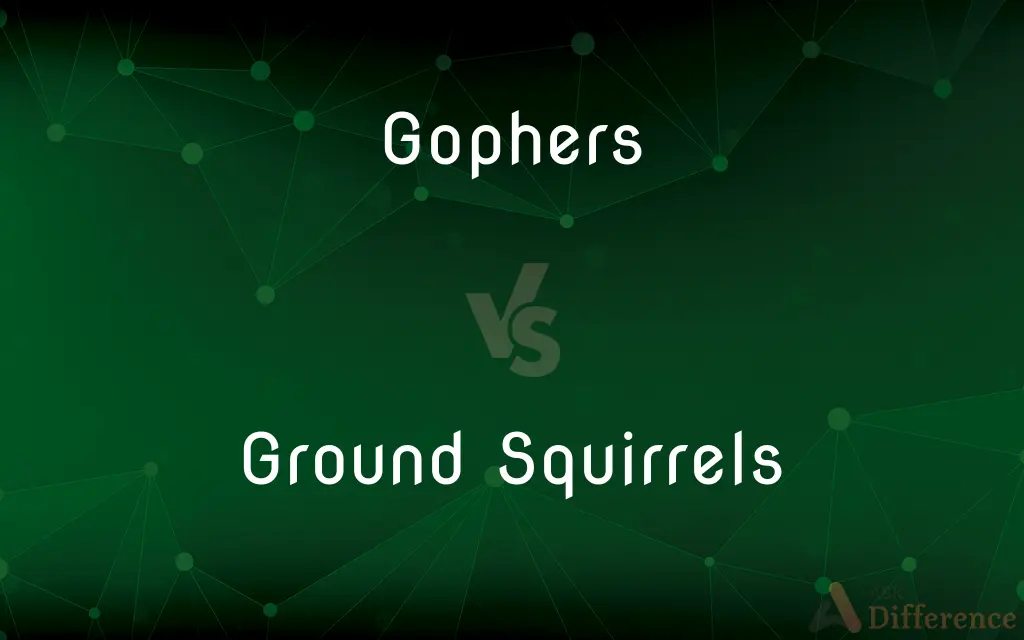Gophers vs. Ground Squirrels — What's the Difference?
By Fiza Rafique & Urooj Arif — Published on March 6, 2024
Gophers are solitary, burrowing rodents known for their extensive tunneling activities, whereas ground squirrels are social animals that live in colonies and create both underground burrows and above-ground nests.

Difference Between Gophers and Ground Squirrels
Table of Contents
ADVERTISEMENT
Key Differences
Gophers, belonging to the family Geomyidae, are noted for their solitary nature and significant impact on soil through their burrowing habits. These animals primarily feed on roots and tubers they encounter while digging underground tunnels, which serve as their living spaces, food storage, and protection against predators. Gophers are equipped with large cheek pouches, which they use to carry food and materials to build their nests.
Ground squirrels, on the other hand, are part of the Sciuridae family, which also includes tree squirrels and chipmunks. These rodents are more social compared to gophers, often living in colonies that provide enhanced protection against predators. Ground squirrels are versatile in their diet, eating seeds, nuts, fruits, and occasionally insects. Unlike gophers, ground squirrels create both underground burrows for shelter and hibernation, and above-ground areas where they can be seen foraging and interacting with other colony members.
One of the main differences in behavior between gophers and ground squirrels is their interaction with the environment and other animals. Gophers are rarely seen above ground and tend to cause more noticeable damage to gardens and farms due to their extensive tunneling and consumption of underground plant parts. Ground squirrels, while also capable of damaging vegetation, are more visible to humans as they spend a significant amount of time above ground.
The physical appearance of these two rodents can also help in their identification. Gophers typically have a more robust build and shorter tails compared to ground squirrels, which have slender bodies and longer, bushier tails. This distinction is noticeable even from a distance, aiding in the differentiation between these commonly confused species.
Both gophers and ground squirrels play roles in their ecosystems by aerating the soil and serving as prey for predators, while their habits, social behavior, and physical characteristics set them apart significantly.
ADVERTISEMENT
Comparison Chart
Family
Geomyidae
Sciuridae
Social Behavior
Solitary
Social, living in colonies
Diet
Primarily roots and tubers
Seeds, nuts, fruits, insects
Burrowing
Extensive underground tunnels
Underground burrows and above-ground nests
Appearance
Robust build, large cheek pouches, shorter tails
Slender body, longer bushy tails
Compare with Definitions
Gophers
Have large cheek pouches for carrying food.
The gopher filled its cheek pouches with plant material to transport to its nest.
Ground Squirrels
Social animals living in colonies.
A colony of ground squirrels was seen foraging together.
Gophers
Rarely seen above ground.
Sightings of a gopher are rare, as it spends most time in its tunnels.
Ground Squirrels
Can damage vegetation but are easier to spot.
Ground squirrels nibbling on garden plants were chased away.
Gophers
Solitary burrowers with extensive tunnel systems.
A gopher damaged the garden's root vegetables with its tunnels.
Ground Squirrels
Eat a varied diet including seeds and insects.
The ground squirrel gathered seeds for its meal.
Gophers
Cause noticeable damage to lawns and gardens.
The uneven lawn was a sign of gopher activity.
Ground Squirrels
Visible above ground during the day.
Ground squirrels basked in the sun near their burrow entrances.
Gophers
Primarily consume roots and tubers.
Gophers feeding on the roots caused the tree to weaken.
Ground Squirrels
Create both underground and above-ground nests.
Ground squirrels were observed entering their burrows near the tree.
Gophers
Any of various short-tailed, burrowing rodents of the family Geomyidae of North America, having fur-lined external cheek pouches. Also called pocket gopher.
Gophers
Any of various ground squirrels of North American prairies.
Gophers
Plural of gopher
Common Curiosities
What is the main difference between gophers and ground squirrels?
Gophers are solitary, primarily underground dwellers with a diet focused on roots, while ground squirrels are social, eat a varied diet, and live in both underground burrows and above-ground areas.
How can you tell a gopher hole from a ground squirrel burrow?
Gopher holes are typically marked by mounded earth in fan-shaped patterns, while ground squirrel burrows may have less soil disturbance visible at the entrance.
Are ground squirrels considered pests?
In many areas, ground squirrels are considered pests due to their potential to damage crops, gardens, and landscaping.
Do gophers or ground squirrels cause more damage to gardens?
Gophers tend to cause more damage to gardens and lawns through their underground tunneling and consumption of root crops.
Can gophers and ground squirrels coexist in the same area?
While they occupy similar habitats, their differing lifestyles and dietary needs can lead to competition for resources.
What methods are effective in controlling gopher and ground squirrel populations?
Control methods vary by region and situation but can include habitat modification, exclusion, trapping, and sometimes poisoning, with considerations for environmental and pet safety.
What predators do gophers and ground squirrels have?
Common predators include snakes, birds of prey, coyotes, and domestic pets like cats and dogs.
How do ground squirrels survive winter?
Many ground squirrel species hibernate during the winter, retreating to their underground burrows to conserve energy.
How do gophers and ground squirrels benefit the ecosystem?
They aerate the soil, disperse seeds, and serve as prey for various predators, contributing to ecological balance.
Do gophers hibernate?
Gophers do not hibernate and are active year-round, although their activity may decrease in colder months.
Share Your Discovery

Previous Comparison
Alkaline Perm vs. Acid Perm
Next Comparison
Baptists vs. ChristiansAuthor Spotlight
Written by
Fiza RafiqueFiza Rafique is a skilled content writer at AskDifference.com, where she meticulously refines and enhances written pieces. Drawing from her vast editorial expertise, Fiza ensures clarity, accuracy, and precision in every article. Passionate about language, she continually seeks to elevate the quality of content for readers worldwide.
Co-written by
Urooj ArifUrooj is a skilled content writer at Ask Difference, known for her exceptional ability to simplify complex topics into engaging and informative content. With a passion for research and a flair for clear, concise writing, she consistently delivers articles that resonate with our diverse audience.













































